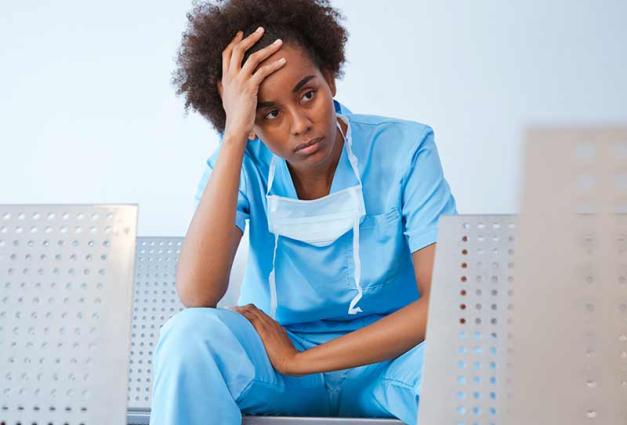It is hard to find anyone who doesn’t know the public health basics of protecting oneself from COVID-19 infection. Don your masks, keep your distances, avoid kissing booths, and move to rural Alaska. Such rules are well-known. But research in health psychology tells us that there are at least six psychological things we can do to minimize our chances of getting COVID-19. These things are all grounded in the fact that you possess an amazing defense against COVID-19. It’s your immune system, and it is nothing short of miraculous. It identifies foreign invaders (pathogens, like the coronavirus), and it blasts them to smithereens. White blood cells, for example, are all soldiers in a microscopic biological army whose job it is to protect you from invaders, whether they be common cold viruses or viruses that cause pandemics.
Most people can take some control over the strength of their immune systems, and it’s not magic. It’s science. Consider the science of stress. In the early 1990s, Sheldon Cohen and his colleagues showed that being stressed out increases a person’s susceptibility to the common cold. That’s right; stress makes it easier to catch a cold. To show this, Cohen’s research team quarantined 394 healthy volunteers and asked them to report how much stress they’d been under recently. Then the researchers dropped live cold viruses into the noses of these volunteers. If social distancing has a polar opposite, that’s it. Cohen’s team found that not everyone caught a cold. Further, participants who had been under less stress recently were less likely to catch a cold than those who were stressed out. Stress weakens your immune system. The obvious implication?
It’s tip one: chillax. That’s not always easy. But anything you can do to reduce your stress during this pandemic should lower your risk for contracting COVID-19. If you don’t like meditation, yoga, or prayer, try spending time with your dog or listening to Summer Walker’s Come Thru. Adjust as necessary for your age, of course. (James Taylor’s Walking Man works for me.) By the way, it appears to be more important to reduce chronic stress than to avoid all possible short-term stressors. But if stress management is not your forte, you can try social support.
That’s tip two: Rely on your friends and loved ones. Research on social support shows that having one or more people you can count on in times of stress directly reduces that stress. Social support means having someone who “always has your back.” An even better definition comes from an obscure folk saying: “A friend will help you move. A good friend will help you move a body.” Studies of social support and health show that having and using social support—especially in tough times—is associated with greater health and well-being. OK, so you hate pets, pop music, and people. That’s OK. Health psychology still has your back—in at least three other ways.
Tip three: Get at least eight hours of sleep on a regular basis — and ideally during roughly the same eight hours (have a consistent bedtime).
Tip four: Get regular aerobic exercise. It doesn’t have to be intense; walking or casual biking is fine; just be sure you elevate your heart rate.
Tip five: Don’t overconsume alcohol. That means you, HJ.
These three healthy habits do more than just make you look and feel good. They directly boost your immune system. Further, regular aerobic exercise also reduces depression and even promotes brain health. I call solutions three to five the big three of physical health. If you can’t do them all, do the ones you can. Maybe you know all too well that you enjoy a little too much wine. (I’ve certainly enjoyed a few glasses of Chilean Malbec myself after having just helped a good friend move a body). But you can compensate for this vice to some degree by exercising—and by exercising good sleep hygiene. Risks add up. But so do defenses.
Tip six: A final way you can probably reduce your risk of COVID-19 infection is to offer social support to others. I say “probably” only because this research didn’t focus directly on viruses. It focused on death from all causes. Stephanie Brown and her colleagues followed senior citizens for more than five years. She found that those who reported giving more help to other people at the beginning of the study lived longer than those who report being less helpful. Moreover, this held true even after controlling for more than a dozen other reasons why some people live longer than others—from being wealthy and not smoking, to being physically active. There appears to be a direct link between helping others and staying physically healthy.
Of course, few people are lucky enough to have control over all six of these drivers of physical health. But if everyone the world overcapitalized on the specific rules that work for them, this would help us win the battle of COVID-19 with fewer unnecessary casualties. To some degree, then, the strength of your immune system is up to you.
For Further Reading
Brown, S.L., Nesse, R.M., Vinokur, A.D., & Smith, D.M. (2003). Providing social support may be more beneficial than receiving it. Results from a prospective study of mortality. Psychological Science, 14, 320-327.
Cohen, S., Tyrrell, D. A., & Smith, A. P. (1991). Psychological stress and susceptibility to the common cold. The New England Journal of Medicine, 325(9), 606-612.
Brett Pelham is a social psychologist—and part-time health psychologist—who is also an associate editor at Character and Context.




